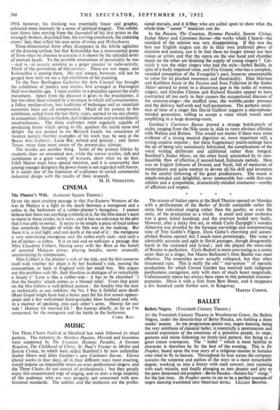CINEMA
The Planter's Wife. (Leicester Square Theatre.) QLTITE the most exciting passage in this Far-Eastern Western of the war in Malaya is a fight to the death between a mongoose and a cobra in the bathroom of a rubber-planter's bungalow. I cannot believe that there was anything symbolic in it, for the film doesn't seem to move in those circles, as it were, and it has no relevance to the plot that I was able to notice. It seems to be simply a piece of local colour that somebody thought of while the film was in the making. But there it is, a real fight, and real death at the end of it ; the mongoose a very convincing mongoose and the cobra every inch—and such a lot of inches—a cobra. It is so real and so well-cast a passage that Miss Claudette Colbert, blazing away with her Bren at the bunch of assorted Malayan extras, playing bandits, seems unusually unconvincing by comparison.
Miss Colbert is the planter's wife of the title, and the film concerns itself with whether her place is by her husband's side, passing the ammunition, or back in England with her small boy. She argies out this problem with Mr. Jack Hawkins in dialogue of so remarkable a fatuity (" Love is like a rubber-tree : it has to be cherished ") that the bandits' attack comes as a blessed relief. From that point on the film follows a well-defined pattern : the bandits bite the dust as realistically as any redskins, the No. 1 boy is faithful unto death (Ram Gopal might have had a better part for his first screen appear- ance) and a few well-aimed hand-grenades blow husband and wife, in a manner of speaking, into each other's arms. Hooray for our side ! Hooray for married life ! But hooray chiefly, as far as I'm concerned, for the mongoose and the battle in the bathroom.
CYRIL RAY.


































 Previous page
Previous page